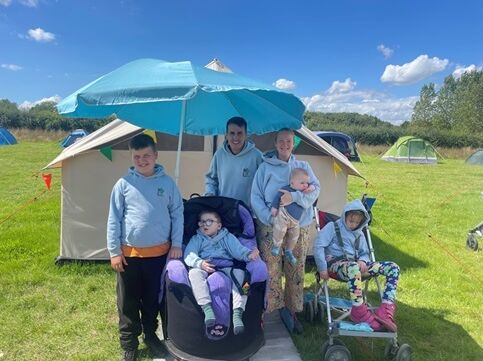Oscar and Mary’s stories: Rett syndrome
Oscar and Mary are 7 and 10 years old and live with their parents in Colchester. After Oscar joined the 100,000 Genomes Project, he was diagnosed with a rare genetic disorder that affects brain development. This diagnosis led to subsequent testing for Mary, who was found to have the same condition.

About Rett syndrome
Rett syndrome is a rare genetic disorder typically caused by a mutation in the MECP2 gene. It results in severe mental and physical disability, affecting children’s ability to speak, walk, eat, and even breathe easily.
Approximately 1 in 10,000 girls
and 1 in 40,000 boys are affected each year
Symptoms do not tend to appear until
a child is between 6 and 18 months old
Oscar and Mary’s stories

Mary’s parents, Thomas and Madalaine, began to suspect that something wasn’t quite right around 18 months to two years after she was born. Mary’s development was slower than usual, being a late walker and behind in terms of her communication. Thomas recalls: “Her favourite word was ‘egg’ and she would call lots of different things that.” Mary was later diagnosed with autism, although the consultant told Thomas and Madalaine that there could be something else affecting Mary beyond this.
Mary’s brother Oscar had problems from birth. It was hard for him to keep milk down and his weight dropped rapidly. There was also an occasion where he stopped breathing and had to be rushed to the hospital, where he was diagnosed with bronchiolitis. As time went on, Oscar showed global developmental delay (when a child's development is significantly behind what is considered typical for their age) and underwent a variety of tests to try to determine the root cause.
Getting a diagnosis
While attending a genetic appointment in Colchester with a specialist from Great Ormond Street Hospital in 2018, they were informed about the 100,000 Genomes Project and their doctor suggested providing blood samples from Oscar and Mary and joining. Thomas said: “Oscar was two and a half at that point and he had been through so much. We were desperate to know what was causing all of it.”
Thomas and Madalaine received a diagnosis for Oscar in September 2020. They were told that a mutation had been spotted within one of his genes which pointed to Rett syndrome. This was likely the reason why Mary was having her issues too, and after agreeing to testing for her she was also diagnosed with Rett syndrome in January 2021.
Reflecting on getting a diagnosis for Oscar and Mary, Thomas said: “Having the answer was a big thing for us and helped us to move on. With Oscar, the uncertainty of not knowing what was causing everything meant it felt like we were living day to day, and we didn’t know what the future held.
“A diagnosis helped give us closure for Mary. We had been told even before joining the 100,000 Genomes Project that there was likely something else besides autism, so we didn’t have to search anymore for what that was.”
Living with Rett syndrome
After getting a diagnosis for Oscar and Mary, Thomas and Madalaine were given informative resources by doctors at Great Ormond Street Hospital and pointed towards Rett UK, who have provided much-welcomed support for the family.
Thomas said: “Joining the Rett community and being able to talk to carers, other families, and specialists has been invaluable. We’ve also been able to make several alterations around the house to help Oscar and Mary.
“Since the diagnoses, both children have regressed and advanced in different ways and there are still lots of challenges. But they make us smile every day. Mary is so affectionate and so loving, and my wife and I love hearing Oscar laugh, which he does a lot especially when he’s playing.”
How whole genome sequencing can help those with Rett syndrome
For Thomas, both whole genome sequencing and increased awareness of Rett Syndrome are important: “A diagnosis helped our family immensely and has changed the way we’re able to care for Oscar and Mary. And we may never have got to that point without the suggestion from doctors that we give whole genome sequencing a try.
“Rett syndrome is such a rare condition that it won’t be the first thing most doctors think of, and there’s always the chance that it’s overlooked entirely even years into a child’s life. If more people know what the signs and symptoms are then parents can start moving towards genetic testing, if that’s what they want, and having the conversations for this to happen.”